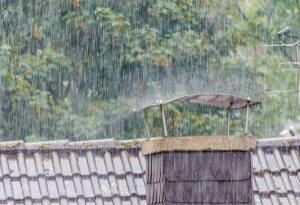What Causes Chimney Leaks In Heavy Rain?
A chimney is an essential part of any home that uses a fireplace or boiler for heating. However, chimney leaks in heavy rain can become a major problem. Chimney leaks in heavy rain can cause damage to your roof, ceilings, and walls, leading to costly repairs. This blog will discuss the causes of chimney leaks in heavy rain, the role of flashing and chimney caps in preventing leaks, and the dangers of ignoring leaks.
Causes of Chimney Leaks in Heavy Rain
Damaged Chimney Crown
There are several reasons why a chimney might leak during heavy rain. One of the most common causes is a damaged chimney crown. The chimney crown is a concrete or masonry cap on top of the chimney stack, discouraging water from entering the flue. If the crown is cracked or damaged, water can seep through and cause leaks. To learn more about chimney crowns and their importance, read our blog “What is a Chimney Crown?.”
Damaged Flashing
Another common cause of chimney leaks in heavy rain is damaged flashing. Flashing is a metal or lead material that is installed at the base of the chimney, where it meets the roof. It is designed to provide a watertight seal between the chimney and the roof. Water can enter the home through the gap if the flashing becomes damaged.

Contact Best Chimney Services for Flashing Repairs
The flashing is one of the first locations to be examined when a chimney leaks to look for fractures or cavities. It allows the elements, notably rainwater, to penetrate the house and cause harm if it is not correctly fastened. Flashing repairs can range from being straightforward to requiring more involved repair work. Our team at Best Chimney Services has over 30 years of experience in flashing repairs. Schedule your flashing estimate today!
The Importance of Using a Chimney Cap and Proper Flashing
Chimney caps and flashing are both essential components of a properly functioning chimney system. Chimney caps are installed on top of the chimney to minimize rain, snow, and debris from entering the chimney flue. They are typically made of metal, such as stainless steel, and come in a variety of sizes and shapes to fit different chimney types. In addition to preventing water damage, chimney caps also serve other important functions. For example, they can prevent animals such as birds, squirrels, and raccoons from entering the chimney, which can be a major nuisance. Chimney caps can also prevent downdrafts from occurring, which can cause smoke and other byproducts of combustion to enter your home.
Flashing is installed around the base of the chimney to create a watertight seal between the chimney and the roof. It is typically made of metal, such as aluminum or copper, and is designed to withstand extreme weather conditions. Properly installed flashing can prevent water from entering the home through the chimney.
There are several types of flashing, including step flashing, continuous flashing, and counter flashing. Step flashing is used on sloped roofs and is designed to overlap each shingle. Continuous flashing is used on flat roofs and is a single piece of metal that is bent to fit the shape of the roof. Counter flashing is installed over the step flashing and is designed to protect the flashing from exposure to the elements. To learn more about why chimney flashing is important, read our blog!
Installing flashing and chimney caps is crucial for reducing leaks during heavy rain. If you suspect that your chimney is leaking, it’s important to have it inspected by a professional to identify the cause of the leak and determine the best course of action to prevent further damage.
Why Ignoring Leaks Can Be Dangerous
If you ignore chimney leaks, they can lead to serious problems. Water damage can weaken the structural integrity of your home, leading to sagging ceilings and walls, mold growth, and even electrical hazards. Leaks can also cause damage to your chimney itself, leading to the need for costly repairs or replacement.
In addition to the physical dangers, chimney leaks can also pose health hazards. Moisture from leaks can create a breeding ground for mold and mildew, which can cause respiratory problems, especially for those with allergies or asthma. In addition, if the leaks cause a damaged flue liner, harmful gasses such as carbon monoxide can seep into your home, posing a serious health risk.
It’s important to address chimney leaks promptly and have them inspected and repaired by a professional. This can help to prevent further damage to your home and protect the health and safety of your family. To learn more about the dangers of moisture in your chimney, read our blog!
Call Best Chimney Services to Prevent Chimney Leaks in Heavy Rain
Are you struggling to know what to do with your leaking chimney? Our team of experienced chimney technicians provides chimney repair services for chimney leaks, including flashing repairs. We also conduct preventive services with chimney waterproofing, chimney liner installation, chimney cap installation, and more! Click here or call (781) 893-6611 to fix or prevent your chimney leaks in the Greater Boston, Massachusetts area.
The post What Causes Chimney Leaks In Heavy Rain? appeared first on Boston's Best Chimney.
